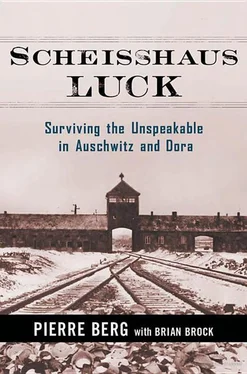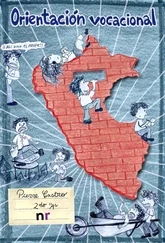“Yes, sure.”
Herr Kies nodded, then climbed the steps to a glass-walled loft.
What I had told him was more truth than bluff. I had become pretty comfortable with the basic language of blueprints. One of our neighbors in Nice was an architect who had designed my parents’ house and four others on the cul-de-sac. While we both waited for plates of his wife’s homemade ravioli, I would look over his shoulder as he worked and ask questions when he put his pencil down. I also studied the blueprints of the Tour de France bikes built in the bicycle shop where I worked. By no means was I an expert, but I was confident that they wouldn’t boot me back outdoors, as they had at the electrical shop.
Herr Kies returned and spread a large blueprint on my bench.
“What is this?”
I looked at the blueprint’s measurements. I had seen something similar in a Nice plumbing store. “Yikes, this is colossal.”
“But what is it?”
“Oh, it’s a hydraulic gate valve. I was just surprised by the huge specifications.”
“Nothing is small in this plant.”
Herr Kies introduced me to the machinists and tool and die makers. Like every Kommando , they were a multinational group of yellow, red, black, and green triangles, every one of them an experienced craftsman.
“Why me?” I finally asked.
“Because I was told you speak four languages, and I need someone to translate to this bunch. I’ve had enough misunderstandings and mistakes.”
My Kapo was right, it was my lucky day. My duty of translating Herr Kies’s German directives into French, English, Spanish, and Italian was a wonderful reprieve from what I had endured the last six months. I felt like a human being again. Herr Kies was a good boss, treating us all with an even hand. Once in a while he would even sneak part of his lunch into my tool drawer. He had lost his arm in the battle of Stalingrad, but he wasn’t bitter about it. He considered himself fortunate because his wound had brought him home before his battalion was decimated.
The shop was responsible for assembling valves and fittings for pipes, and for repairing equipment for other shops, but its main duty was to line and glue plastic sleeves into five-meter-long pipes.
With Germany cut off from the supply of many raw materials, the pipes used in the Buna plant were made of rolled steel or cast iron.
Because they lacked any stainless alloys, it was our job to line the insides of the pipes with plastic to protect them from the corrosive fluids that would flow through. We would coat the insides with an adhesive, using a sponge attached to the end of a long wooden rod, then insert a long sleeve of soft plastic, pressing it against the pipes with a spreader. We would stretch the plastic over the face of the pipes’ flanges, which another shop had welded on. If the flanges were warped from the welding, we would resurface them on a lathe.
Pipes would then be placed in the shop’s kiln to fuse the plastic. It took a half-hour to bake a dozen pipes. Once cooled, we would use drills to clear the plastic out of the flanges’ four assembly holes.
With the plastic covering the flanges there was no need for a gasket when the pipes were bolted together. Many times, once the trenches were dug, we would be the ones to assemble and bury the pipes.
Near my workbench I found a page from a magazine that must have been used as packing material. I figured I could use it as cigarette paper until I saw that it was from a French magazine. There was an ad, a picture of two people, and the last half of an article. I put it under my shirt, and back in my Block that night I hid it under my pillow. I must have read that page more than a dozen times that week before it disappeared. It was the first thing I had read in six months. In Drancy, I was able to at least read the newspapers the gendarmes had left. Hell, there I had a semblance of a social life. At night we played cards, cracked jokes, listened to someone blowing Glenn Miller’s “Don’t Sit Under the Apple Tree” on the harmon-ica, or a few voices singing the Yiddish tune “ Bei Mir Bist Du Schön” that the Andrews Sisters made popular. It all helped to keep my mind off the fact that I was a prisoner. The only things that kept me from dwelling on my plight in Monowitz were physical exhaustion and unbearable hunger.
One evening, a group of us watched through a window in our Block as the orange halo of an immense fire bloomed in the direction of the main camp. Its unusual intensity puzzled us. This was no ordinary blaze. We speculated that a methanol pipeline or tank had ignited. Whatever it was, it burned through the night. At the plant the next morning, I spotted an English POW who had been friendly with me in the past. I asked him if one of their Blocks had burned down.
“Oh, no. It was on the other side of our camp. One of our guards told me that the SS had wiped out forty-four thousand Gypsies in one night. The Jerry said they were bragging how efficiently they had done it.”
“Forty-four thousand? Are you sure it wasn’t forty-four hundred?” I asked in my shaky English.
“No, you got it right, chap.”
We parted without another word.
Forty-four thousand? I knew of the existence of the brown triangle Gypsies, but I had never crossed paths with a single one.
That day I was acutely aware of every SS guard I passed at the plant. They had been so secretive about their slaughters for so long, and now they were brazenly bragging. Was mass murder that easy? I guess if you can kill one in cold blood, what’s another four or a thousand or forty thousand?
I had become numb to their savagery, and I hated them for doing that to me. I knew I would remember the girl from the Puff, maybe Mario and Pressburger, but my other fellow Muselmänner were just faceless cattle in the slaughterhouse.
Rumors circulated for a week about what had happened that night. One was that the Gypsies had been exterminated to make room for skilled Häftlinge from the camps near the Eastern Front.
True or not, it was sobering reminder that there was nothing preventing the SS from processing all of us the same way once they had no use for us. Another was that the crematoriums had broken down that night, and after the Gypsies had been gassed their bodies were torched in open pits along with many arriving Jews. [7] On August 2, 1944, 2,897 Roma (Gypsy) men, women, and children were taken from their camp in Birkenau and gassed. Their bodies were incinerated in pits because the crematoriums weren’t functioning at the time.
The “prominent” Häftlinge arriving from the abandoned Eastern Front camps found themselves stripped of their status and privileges. For some this was as good as being sent to the gas chambers.
One morning before roll call I noticed fifteen “pajamas” standing in a circle, yelling obscenities. In the center was a bloodied Häftling screaming for help. He was being pushed and punched from all sides. Grinning and laughing, the guards watched from the fence. I was sure they were taking bets. The man finally collapsed to the ground, and the infuriated “pajamas” kicked him until he was just a bloody mess of broken bones. He was dead or in a coma. Either way, the Transportation Kommando would make sure he was on the back of their truck. Out of curiosity, I asked a yellow triangle standing at the circle’s perimeter why they had done him in. He told me the man had been a Jewish policeman in one of the ghettos.
“He was the worst of the bunch. A son of a bitch.”
Well, if that many guys have decided that he had it coming, he must have deserved it, I thought as I lined up in my Kommando .
Читать дальше












